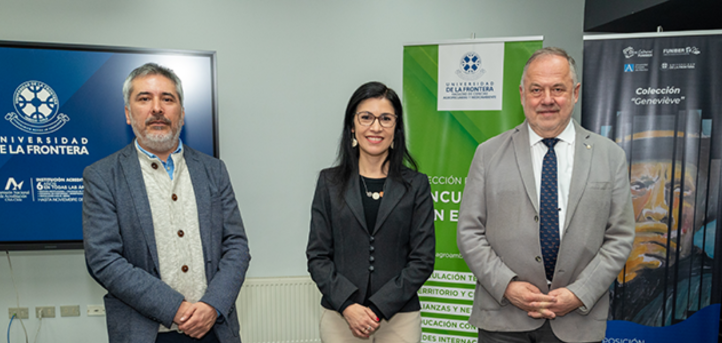The Obra Cultural de FUNIBER y UNEATLANTICO (Cultural Work of FUNIBER and UNEATLANTICO) opens the exhibition “Picasso: Aún sorprendo” (Picasso: I Still Surprise) in room 101 of the Aula Magna (Magna Hall) of the Universidad de La Frontera (University of the Frontier, UFRO) in Temuco (Chile).
The opening ceremony was attended by UFRO authorities led by Dr. Eduardo Hebel Weiss, rector of the institution; Dr. Adison Altamirano, dean of the Faculty of Agricultural Sciences and Environment; and Vivian Lipari, director of FUNIBER Chile.
“Picasso: Aún sorprendendo” is made up of three complete collections. The first of these, “Les Bleus de Barcelona,” (The Blues of Barcelona) consists of 11 works. The second, “Bailarines” (Dancers), with 14 engravings on leather with images of dancers, includes academic drawings, most of them with a single stroke, which show a total mastery of technique and classical aesthetic sense.
The last collection, “Geneviève,” integrates 12 works on Japanese paper that Picasso gave to his young lover. The drawings for Geneviève, made in the 1950s and published in 1974, show her nude or only half-length, from the front and in profile, and even playing with Cupid. It is a collection of spontaneous and decorative drawings that are very dynamic, surprising, and little known. Geneviève put some drawings on sale in the 1980s.
Vivian Lipari, director of FUNIBER in Chile, stressed the importance of generating a rapprochement between art and society: “For FUNIBER, holding these traveling exhibitions of great art referents has the objective that people connect with each other with art and that from these instances they can reflect since art brings us closer, connects us, and allows us to be more reflective.”
The director of FUNIBER Chile has emphasized that, despite not being the most representative collections of the Spanish artist, “they lead us to discover his personal stage developed between Barcelona and Paris, thus elucidating his great technique and his first steps in the different stages and artistic movements in which he participated.”
On the other hand, the good bilateral relationship between Universidad de La Frontera and Universidad Europea del Atlántico is worth mentioning. This relationship goes beyond the artistic and cultural field. The two institutions have met on previous occasions, as well as during the visit of the Secretary General and Vice-Rector of International Relations of UNEATLANTICO, Roberto Ruiz. During his trip to Chile, Ruiz gave a lecture on “The great challenge of Higher Education in the European Education Area” at the Faculty of Agricultural Sciences and Environment of the UFRO.


